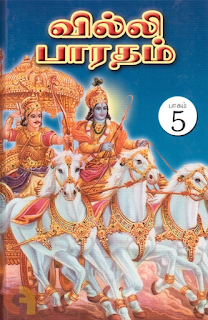Nanda had to go outside for some work, but he was wary of leaving the baby alone. Some gopa kids were running around the place, but they could not be relied upon to protect his precious baby.
So, he followed what was a common gopa custom – he placed the wheel of an old cart near the baby, to ward off any danger from evil sources. He left home, reassured that no harm would come to little Krishna.
 |
| Source: https://godivinity.org/wp-content/uploads/2019/06/IMG-20190613-WA0020-231x300.jpg |
Unknown to him, the demon Shakataasura sent by Kamsa, had entered that very same wheel. The plan was to fall on the baby and crush him, making the entire event appear like an accident.
Rakshasa proposes, God disposes!
Baby Krishna woke up, and like children all over the world do, He began to wail for His mother, flailing his tiny arms and legs about.
The next instant, one baby leg extended, and kicked the wheel with the hidden demon!
There was a loud crashing sound, and hearing that, Yashoda raced to her little one, scared for His safety.
As she clutched Him to her, and smothered Him with kisses while simultaneously examining Him for injuries, one of the gopa boys who had been playing nearby came to her.
Wide-eyed with wonder, he said to Yashoda, “Baby Krishna kicked the cart wheel and it shattered into pieces!”
Yashoda refused to believe him. “What nonsense! See my baby’s feet – so tiny and delicate! Do you think they can do what you say?”
Baby Krishna’s face split into a huge grin and the gopa boy could swear the baby actually winked at him!
All Srivaishnavas wear the Urdhva Pundra on their forehead (and the men, on 11 other spots on their body). This is called as the Tirumann Kaapu – literally translating into “The Sacred Clay that Protects.” The two vertical white lines of the Urdhva Pundra denote the Lord’s lotus feet, and the central red / yellow line denotes Mahalakshmi Devi.
You must have seen pictures of Lord Venkateshwara of Tirumala. What do you first notice about His face? Of course, the same Tirumann Kaapu!
 |
| Source: https://indianfolkart.org/wp-content/uploads/2020/11/TNJ-PAINT-7-1.jpeg.webp |
We wear that mark so that we get His protection. But then, why does He wear that mark on His own forehead?
Azhwar beautifully explains the reason using the Shakataasura episode we described before. He says, “I always knew that Your holy feet protect me. But now I realized that Your holy feet protect You also! With those tiny Feet only You protected Yourself from the evil asura!”
When Putana’s life had been sucked out by baby Krishna, she had reverted to her hideous rakshasa form.
But in case of Shakatasura, there is no mention of his form even being discovered. Why was that so?
The Acharyas explain that the divine feet of the Lord only purify and grant liberation; They never destroy. When He kicked Shakataasura with His foot, the demon’s body disintegrated, and he got moksha instantly, and therefore, there was no trace of his body.
Another explanation for why the Lord sports the Urdhva Pundra comes from the incident when the Lord once got Swami Ramanujacharya to apply the Tirumann on His forehead, and became his disciple! (Read this old post if you haven’t already)
But perhaps, can it be possible that just as the devotees declares his servitude to the Lord by wearing the Tirumann Kaapu, the Lord is proclaiming His servitude to His devotees by wearing the same Tirumann on His forehead ?
For, it was this very Lord Srimannarayana, who told Rishi Durvasa during the Ambarisha episode,











